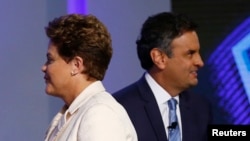Brazil's annual inflation rate in September shot way above an official target to its highest in nearly three years, the latest economic blow for President Dilma Rousseff who is locked in a tight race for re-election against market-favorite Aecio Neves.
Consumer prices rose a faster-than-expected, 6.75 percent in the 12 months through September, the quickest pace since October 2011, government data showed on Wednesday.
The inflation spike raised the prospect of higher interest rates next year, giving fresh ammunition to Neves as bad economic news continues to pile up ahead of an October 26 runoff vote.
Brazil has slipped into recession in the first half of the year and will barely grow in 2014, according to International Monetary Fund forecasts released on Tuesday and later dismissed by Finance Minister Guido Mantega as too pessimistic.
The South American country, a market darling until just a few years ago, also received on Wednesday another debt downgrade warning by Moody's Investors Service.
“This adds fuel to the fire,” said Juan Jensen, an economist with consultancy firm Tendencias in Sao Paulo. “The economy as a whole looks very bad with high inflation and weak growth. This will certainly be discussed in the campaign as it helps deconstruct Rousseff's image.”
Inflation is a politically sensitive issue in a country traumatized by runaway prices in the past. It contributed to erode Rousseff's popularity ahead of last Sunday's vote, even though it remains much lower than it was 20 years ago.
While Rousseff retained an 8 percentage-point lead over Neves in the first-round of elections, many analysts say he may pull ahead in upcoming opinion polls with the potential endorsement of former candidate Marina Silva, who finished third in the race.
Interest rates could go higher
Inflation will probably subside slightly after the election, economists say. Yet the central bank risks missing its target this year for the first time since 2003, even after raising interest rates to 11 percent, the highest in over two years.
“This strengthens the case for further hikes in interest rates once the election is out of the way,” said Neil Shearing, chief emerging markets economist at Capital Economics.
Yields on interest rate futures maturing in the next couple of years rose as traders also added bets on tighter monetary policy.
High interest rates make public debt costlier and hinder already sluggish economic growth, a dangerous combination for Brazil's long-term economic prospects.
Ratings agency Standard & Poor's downgraded Brazil's debt closer to junk territory earlier this year, and Moody's on Wednesday threatened to do the same if the next president pursues “more of the same” economic policies.
The firm, which has issued a series of downgrade warnings since slapping a negative outlook on Brazil's rating last month, said the next government's main challenge will be to ensure “that the status quo will not be maintained.”
When compared to August, consumer prices rose 0.57 percent, up from 0.25 percent in the prior month. The median forecast of 29 economists surveyed by Reuters projected an increase of 0.47 percent.
BRASILIA/RIO DE JANEIRO —





